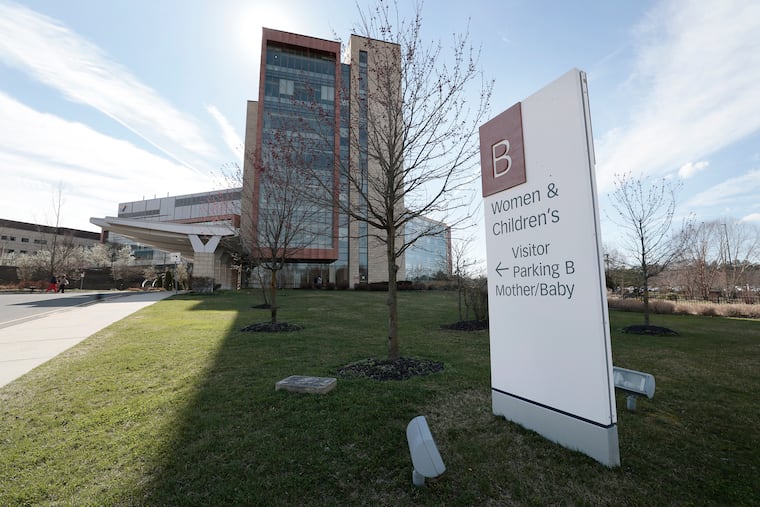Virtua Health sued by New Jersey AG over ‘discriminatory’ drug-test policy for pregnant patients
New Jersey’s attorney general says the nonprofit health system’s policy violates antibias and privacy laws.

Virtua Health’s policy of universally drug testing pregnant patients violates the state’s antidiscrimination law, New Jersey Attorney General Matthew J. Platkin said in a lawsuit filed Thursday, claiming the nonprofit health system’s policy unfairly catapults families into a child-welfare investigation that can separate newborns from their parents.
The lawsuit, filed in New Jersey’s Superior Court, also claims that Virtua’s South Jersey hospitals in Voorhees, Mount Holly, and Camden violated patient privacy laws and their own policies by not obtaining informed consent before testing patients’ urine for drugs.
Virtua does not submit any other group of patients to universal drug testing, Platkin’s lawsuit said. In doing so with pregnant patients, Virtua violated its own policy, which requires providers to obtain consent before collecting urine samples for drug testing, the lawsuit claims.
“Virtua’s practices single out pregnant patients for mandatory drug testing without informed consent. As a result, patients are unnecessarily traumatized and fear they will lose their children mere hours after giving birth,” Sundeep Iyer, director of the Division on Civil Rights within the Attorney General’s Office, said in a statement.
Drug screening among pregnant patients is controversial because the urine tests commonly used at hospitals have a high false-positive rate, and the results can be skewed by consuming items as common as poppy seeds, over-the-counter pain relievers, and some prescription anxiety medications.
The American College of Obstetrics and Gynecology, a leading medical professional organization, recommends that drug testing only be done among pregnant patients who have agreed to it, and that families should not be separated solely based on a drug test’s results.
Following the national organization’s guidance, many hospital systems have adopted drug-screening policies that require informed consent and that favor verbal screening methods over urine tests. Yet universal drug testing remains common nationally, and parents may be reported for suspected child abuse within hours of giving birth if their drug screen comes back positive, according to an investigation published by the Marshall Project earlier this month.
A spokesperson for Virtua said the system provides “safe, exceptional maternity experiences” for thousands of families.
“We hold the safety and well-being of each patient paramount, especially our newborns. We have a relentless commitment to evidence-based, equitable care for every family, additionally meeting the highest standards of regulatory compliance,” Daniel Moise, a Virtua spokesperson, said in a statement.
He declined to provide more detail about Virtua’s policy or respond to the attorney general’s allegations of discrimination because the lawsuit is pending.
New Jersey is among several states that require hospitals to report positive drug tests among pregnant patients to child protective services.
Virtua hospitals in Voorhees, Mount Holly, and Camden accounted for nearly a quarter of such reports made to the state’s Division of Child Protection and Permanency between 2021 and 2023, despite delivering just 9% of babies in the state during that time, according to a state investigation.
A total of 46 New Jersey hospitals made reports of substance-affected newborns.
Two Virtua Voorhees patients at center of N.J. lawsuit
The lawsuit details the experience of two patients who were subjected to mandatory drug testing before giving birth at Virtua Voorhees.
After being admitted to the labor and delivery unit, both patients gave urine samples that they assumed would be tested for protein levels, a metric commonly used to monitor the baby’s growth and the mother’s risk for complications, such as preeclampsia. Neither patient was told she was being tested for drugs, according to the lawsuit.
Both women had eaten foods containing poppy seeds, and their tests came back positive for drugs. The women were subjected to monthslong investigations by New Jersey’s child protective services agency after the hospital reported them for suspected abuse.
Parents who are being investigated for potential child abuse may not be able to take their baby home from the hospital and are subjected to unannounced home visits, and their other children may be interviewed by authorities. Their child could ultimately be taken away from them, according to the Attorney General’s Office.
High rate of false positive drug tests
Hospitals across the nation commonly screen pregnant patients for drug use in the interest of protecting infants who may have been exposed to drugs in utero and require additional support or monitoring after birth, the Marshall Project’s investigation found.
But the urine tests used have a false positive rate of up to 50%, according to some studies.
» READ MORE: A Philadelphia man said he was sober, but kept testing positive for alcohol. How did a UPenn doctor crack the case?
In other settings where urine drug tests are required, positive results must be verified with additional testing. But the Marshall Project found that hospitals often report positive drug screens from pregnant patients immediately, without additional testing to verify the results.
This can lead to hardships, such as newborns being separated from their parents in their first weeks of life, unannounced home visits from social workers, and other children being removed from the home.